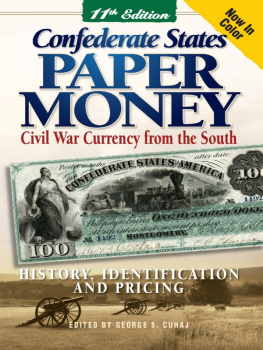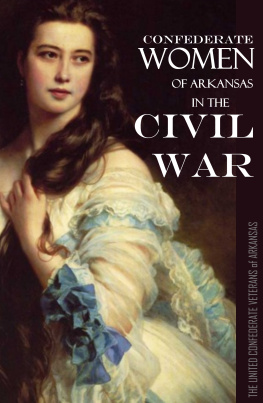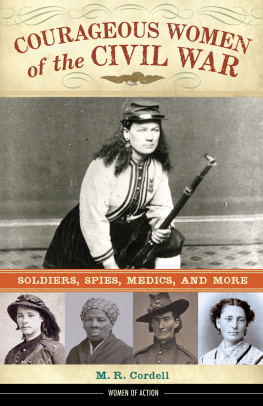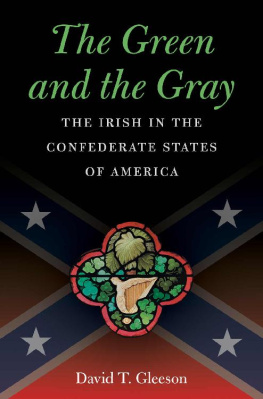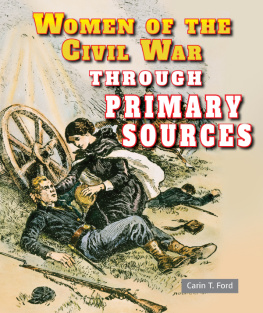Elite Confederate Women in the American Civil War
Elite Confederate Women in the American Civil War is a wide-ranging primary source collection that offers a compelling selection of upper-class, white Confederate womens voices from archives across the South.
From the prison diary of Mary Terry to Elizabeth Baker Croziers eyewitness account of the siege of Knoxville, this volume introduces lesser-known voices of the war to show the interconnections between the home front and the front lines, and how the war shaped the lives of women and households across the South. This collection challenges students to engage with the role of first-person narratives in history and to reconsider the roles of southern women in the Civil War. Exploring the themes of slavery, nationalism, secession and occupation, these narratives offer new ways to think about traditional issues in Civil War history and, more broadly, show the ways in which studies of women and gender can enrich studies of cultures of war.
This book is designed for undergraduate and graduate students of both the American Civil War and womens history.
Kristen Brill is Lecturer in American History at Keele University, UK.
First published 2021
by Routledge
52 Vanderbilt Avenue, New York, NY 10017
and by Routledge
2 Park Square, Milton Park, Abingdon, Oxon OX14 4RN
Routledge is an imprint of the Taylor & Francis Group, an informa business
2021 Taylor & Francis
The right of Kristen Brill to be identified as the author of the editorial material, and of the authors for their individual chapters, has been asserted in accordance with sections 77 and 78 of the Copyright, Designs and Patents Act 1988.
All rights reserved. No part of this book may be reprinted or reproduced or utilised in any form or by any electronic, mechanical, or other means, now known or hereafter invented, including photocopying and recording, or in any information storage or retrieval system, without permission in writing from the publishers.
Trademark notice: Product or corporate names may be trademarks or registered trademarks, and are used only for identification and explanation without intent to infringe.
Library of Congress Cataloging-in-Publication Data
A catalog record has been requested for this book
ISBN: 978-1-138-91615-9 (hbk)
ISBN: 978-1-138-91616-6 (pbk)
ISBN: 978-1-315-68981-4 (ebk)
Typeset in Bembo
by codeMantra
1.1 Sowing and Reaping, May 23, 1863
2.1 Making clothes for the boys in the army, 1864
4.1 The ladies of New Orleans before Gen. Butlers Proclamation, 1862
5.1 Chicora the original name of Carolina, 1861
8.1 Unidentified woman holding a cased photograph of an unidentified Soldier in Confederate uniform, c. 1861
10.1 A female rebel in Baltimore an everyday scene, September 7, 1861
C.1 Richmond, Virginia. (Two Women in Black), 1865
C.2 President Lincoln riding through Richmond, April 4, amid the Enthusiastic cheers of the inhabitants, 1865
I am indebted to the expertise and generosity of archives and archivists across the South, without whom this book would not have been possible. In particular, I would like to extend my heartfelt thanks to John McClure and Eileen Parris at the Virginia Museum of History and Culture; Teresa Roane at the Caroline Meriwether Goodlett Library, United Daughters of the Confederacy; Kyle Hovious at the University of Tennessee at Knoxville Special Collections Library; Jessica Eichlin at the West Virginia and Regional History Center, University of West Virginia; Matthew Turi at the Louis Round Wilson Special Collections Library, University of North Carolina at Chapel Hill; and the staff at the Library of Virginia.
I would also like to thank the editorial team at Routledge, especially Emily Irvine and Kimberly Smith, for their encouragement and support of this project.
Lucy Wood Butler was a Civil War bride. She married her fianc Waddy Butler on July 3, 1861, after meeting while he was student at the University of Virginia in 1859. Serving with the 2nd Florida Infantry, Butler would later die in 1863 leaving Lucy Wood Butler both a Civil War bride and widow. In March 1863, writing from Charlottesville, Virginia, before the death of her husband, Butler questioned her ability to effectively communicate her thoughts and experiences of the war,
How like my words are to a poor picture, mere symbols or signs of the inward thought as the picture is composed of the signs of nature that would fain be imitated; though often the language I use consists of mere sounds that none of my audience can interpret and I can scarcely understand myself. Oh, would that I could express my thoughts and my feelings!
Similarly, 19-year-old, unmarried Ida Dulany lived on her familys Oakley Farm Plantation in Upperville, Fauquier County, Virginia, while her husband, Hal, served with the 6th Virginia Cavalry Regiment. In August 1864, Dulany worried about the historical authenticity of her diary:
I have been looking over my journal today and I find many errors, some gross misstatements as to facts. It would be impossible to correct them all, so I will let all stand. The truth will be shown by history, and my statements that conflict with the truth will serve to show how in these times of trouble we are imposed upon by intentional and unintentional misrepresentation.
While women Civil War diarists, like Lucy Butler, Womens wartime accounts and postwar accounts of their memories of war provide an unparalleled insight into the dynamics and relations of the southern home front.
Womens Civil War diaries and narratives may have been doubted by their own creators, but they have since become paramount in the study of the war. The following collection presents some of these accounts; in doing so, this collection illustrates how useful womens voices of the war can be to extend and complicate understandings of the Civil War and womens roles in the war.
This volume shows the interconnections between the front lines and the home front, the ways in which political and military affairs shaped womens everyday lives and experiences of war. This volume centralizes first-person accounts and womens voices to studies of war and conflict. These texts demonstrate how the intimate private sphere experiences of individuals, particularly those without a voice in the public sphere, can nuance understandings of wider societal issues related to cultures of war and conflict. As such, womens narratives can be read with an eye not only to emphasize womens lived experiences in the overarching narrative of the Civil War, but also to provide an alternative lens to study issues surrounding power and politics in Confederate society. This collection also shows how experiences of war were gendered, and how women across the Confederacy experienced the war in different ways according to such issues as race, class, age, kinship networks and location. There was no universal definition of Confederate womens wartime experience; it was different for each Confederate woman.
This volume is composed of narratives written by upper class white women. Most of these women lived in households that owned slaves.occupation.
Considering the acceptance or rejection of Confederate nationalism, in both words and actions, offers a rich comparative lens for the following accounts.
Several of the narratives discuss secession, on both the regional and state levels.). For McCord and others, secession represented a sharp breakage with the Old South in its remapping of political power in government as well as a remapping of the roles of individuals in society. While many women celebrated secession, there was also uncertainty and insecurity as to what the future held for the newly independent southern states and how womens lives would change in the establishment of this new republic. Secession represented not only political change for collective society, but social and cultural change for individuals.



